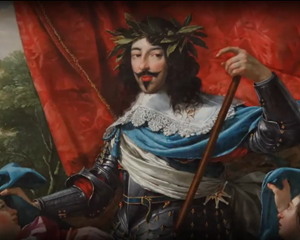Bonjour, I'm Mike Rugnetta, this is Crash Course Theater, and bienvenue to our second episode set in France: French Renaissance 2: The Renaissancening.
大家好 我是迈克·鲁格内塔 这里是"戏剧速成课堂" 欢迎来到我们的法国第二集:法国文艺复兴2:复兴
Today, we're taking a closer look at theater architecture in Renaissance France, company organization, and the status of actors.
今天 我们将深入了解文艺复兴时期法国的剧院建筑、公司组织以及演员的地位
And remember all of those neoclassical rules from the last time?
还记得上次提到的新古典主义的规则吗
Today we'll meet a guy who broke a bunch of them: the hilarious, possibly incestuous, much-buried comic writer Jean-Baptiste Poquelin, better known as Moliere.
今天我们会说到一个小伙子 这个小伙子打破了其中一些规则:滑稽的、可能乱伦的、才华被埋没了的喜剧作家让-巴蒂斯特·波奎林 他更广为人知的名字是莫里哀
We'll look at his most controversial play Tartuffe, and also the play that killed him.
我们来看看他最具争议的戏剧《达尔杜弗》 也是害他丢掉性命的一部戏剧
So grab your baguette, and let's go.
所以 拿好你的法棍 咱们开始吧
The first French theaters weren't purpose-built… for theater. Most were former tennis courts. Really, really large tennis courts.
法国最早的剧院不是专门为戏剧而建的 大都是以前的网球场 非常非常大的网球场
But in 1548, the main producer of mystery plays, the Confrerie de la Passion, decided to build a permanent home, the Hotel de Bourgogne.
但是在1548年 神秘剧的主要创作人 即耶稣受难兄弟会 决定为自己建造一个永久的家园 也就是勃艮第酒店
The government outlawed mystery plays that same year, though, so the Confrerie accidentally ended up owning a secular theater.
同年 政府宣布神秘剧为非法 所以这个剧团拥有一家世俗剧院的梦想最终意外破灭了
It consisted of a pit or parterre below and a bunch of galleries and boxes above,
剧院下面是一处正厅后排 上面是很多的画廊和包间
the highest of them called the paradis, because it was so close to heaven. Get it?
最高的地方被称为天堂 因为太接近天堂了 懂吗
In 1634 the Theatre du Marais was built, on the site of a former tennis court, of course.
1634年建造了马雷剧院 正好建在原来的网球场上
It burned down, and a nicer version was built in 1644. So the Hotel de Bourgogne had to get nicer, too.
后来被烧毁了 不过1644年又重建了一家更好的 所以 勃艮第酒店也必须变得更好
At first, these theaters were built assuming medieval style scenery, not all that fancy Italian chariot and pole stuff, but they got there eventually.
起初这些剧院都是仿照中世纪风格建造的 没有意大利的那种豪华战车和钢管之类的东西 不过最终是建成了
The government didn't allow a theater troupe to settle permanently in Paris until 1629,
直到1629年 政府才允许剧团人员在巴黎永久定居

so in the early years, the Confrerie rented the theater to some of the hundreds of touring companies who just happened to be passing through.
所以在最初的几年里 这家剧团把剧院租给了碰巧路过的几百家巡演公司的其中一些
The repertory, then, mostly consisted of medieval farces, classical adaptations, and foreign plays,
当时的剧目大多是中世纪的滑稽剧、经典改编剧和外国戏剧
plus a handful of new French pastorals and tragedies when they got lucky.
运气好的话还能看到几部新的法国乡村剧和悲剧
In 1629, the king allowed the Troupe Royale to settle in at the Hotel de Bourgogne.
1629年 国王允许皇家剧团在勃艮第酒店定居
And in 1643 another company was allowed to take over the Theatre du Marais.
1643年 另一家公司获准接管马雷剧院
They were joined in 1658 by Moliere's company, the Theatre de Monsieur.
1658年,莫里哀的剧团"先生剧院"也加入进来
Now that theaters have actors, who went to go see those actors at their theaters?
所以 既然剧院都有演员了 那谁去剧院看那些演员呢
Well, everyone! Though women usually wore masks.
嗯 大家都去看 女人去看的话通常要戴面具
Like London, performances took place in the afternoons. Unlike London, the snack bar sold macarons. C'est magnifique!
和伦敦一样的是演出都在下午进行 不一样的是小吃店里售卖马卡龙(法国美食) 很给力!
Nobles were sometime seated on the edge of the stage, scandalously close to the working men standing in the pit.
贵族们的座位被安排在舞台边缘 不解的是工人的位置就在离他们很近的正厅后排
Companies usually consisted of eight to twelve actors, plus a couple of apprentices, and every member shared some of the proceeds.
剧团通常有8到12名演员 外加两名学徒 挣的钱大家一块儿分
After 1607 women performed as well.
1607年之后 女人也被允许上台表演
The status of actors remained dicey, but in 1641 superfan Louis XIII issued a proclamation saying that
那时演员的地位还不明确 直到1641年 超级粉丝路易斯十三世发布了一则公告说
actors should be really, really careful not to perform anything immoral or indecent.
演员要格外注意 不能做出任何不道德或者不得体的行为
But as long as they avoided lewdness, "we desire that their occupation, which is capable of providing innocent diversion for our people
不过只要演员们行为检点 “该职业能够为人民提供无罪典范、
from certain blameworthy activities, shall not be held to their discredit, nor prejudice their reputation."
避免人民做出受道德谴责的行为,因而不得损害演员的名誉。”
Isn't it nice when acting isn't criminalized? I think it's nice when acting isn't criminalized.
演戏合法不是很好吗?我觉得演戏合法挺好的
But, that still doesn't change the church's habit of denying actors baptism, marriage or Christian burial.
不过 教会还是和之前一样拒绝为演员洗礼、主持婚礼以及举行基督葬礼
So we've come a long way, I guess. Still plenty far to go, though.
所以 演员们的地位虽然已经提升一大截了 不过想要真正翻身还待时日
As Louis XIII's proclamation suggests, his successor Louis XIV, and their chief ministers loved theater
正如路易十三的宣言所述 他的继任者路易十四和他们的大部长们都喜爱戏剧
and made France the performing arts vanguard of the late Renaissance.
并促使法国成了文艺复兴后期的表演艺术先锋
Richelieu was such a fan that he had a theater built into his own house, the Palais Cardinal, and made sure there was plenty of Italianate scenery to fill it.
黎塞留公爵(法国贵族)是戏剧的超粉 他在自己家里建造了一座剧院 即“主教剧院” 并在里面搞了很多意大利风景元素
But even before Richelieu's time, the court went big for royal entries, processions, festivals and masques, called ballets de cour.
但早在黎塞留之前 宫廷就热衷于皇室的比赛、游行、节日和化装舞会 这些活动被称为“宫廷芭蕾”
Remember those really expensive and elaborate masques that sort of bankrupted England and helped bring about the Civil War?
还记得那些昂贵而精致的假面剧吗 那些让英国破产并引发内战的假面剧
Charles picked up the habit in France. Louis XIV loved masques.
查尔斯将它引进法国 路易十四非常喜欢假面剧
When Versailles was being built, he sponsored one called "Pleasures of the Enchanted Island." And It lasted three days.
凡尔赛宫建造之时 他赞助了一部名为《魔岛之乐》的假面剧 演出持续了三天
Around this time, opera also came into vogue, courtesy of composer Jean-Baptiste Lully.
大约就在这个时候 歌剧也开始流行起来 这是作曲家让-巴蒂斯特·吕里的功劳
Other kinds of theater weren't as fancy.
其他类型的戏剧欢迎度就没有那么高了
French comedy was mostly a mix of medieval farce and ancient sources with jokes borrowed from touring Italian commedia dell'arte players.
法国喜剧主要是中世纪的闹剧和一些旧时资源的结合 旧时资源里面的段子都是从巡回演出的意大利喜剧演员那里借来的
In the seventeenth century, a popular homegrown troupe emerged consisting of the actor-writers Turlupin, Gros-Guillaume, and Gaultier-Garguille.
17世纪出现了一个颇受欢迎的本土剧团 剧团成员有特鲁平、格罗斯-纪尧姆和高缇耶-加尔盖耶 三人的身份都是演员兼编剧
Obviously these are stage names. No one names their kid "Fat William." Or Turlupin.
很显然这些都是艺名 因为没人会给自己的孩子取名为“胖威廉” 或者特鲁平什么的
Gaultier played old men, Gros-Guillaume played fat men, Turlupin played wily servants.
高缇耶演一个老人 格罗斯-纪尧姆演一个胖子 特鲁平演一个狡猾的仆人
They became so popular that they had to play two shows a day in their temporary theater, which upset the more respectable actors at the Hotel de Bourgogne.
他们在当时很受欢迎 每天要在临时剧院里演两场 这让勃艮第酒店里的那群更受尊敬的演员们感到很不安
Those actors appealed to Richelieu.
这些演员们深深吸引着黎塞留
He went and saw the comedians and decided...they were funny! They should join the Bourgogne's Troupe Royale!
他去看了喜剧演员之后说:他们太有趣了 他们应该加入勃艮第的皇家剧团
And that went pretty well until Gros-Guillaume made fun of a magistrate… and then was thrown into jail… and died.
一切都进展得很顺利 直到格罗斯-纪尧姆取笑了一个地方官……之后被丢进监狱……最后挂掉了












